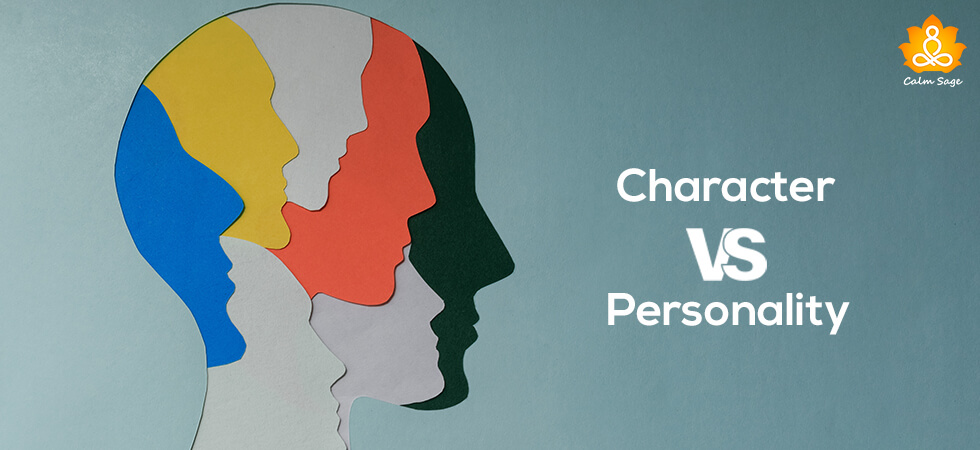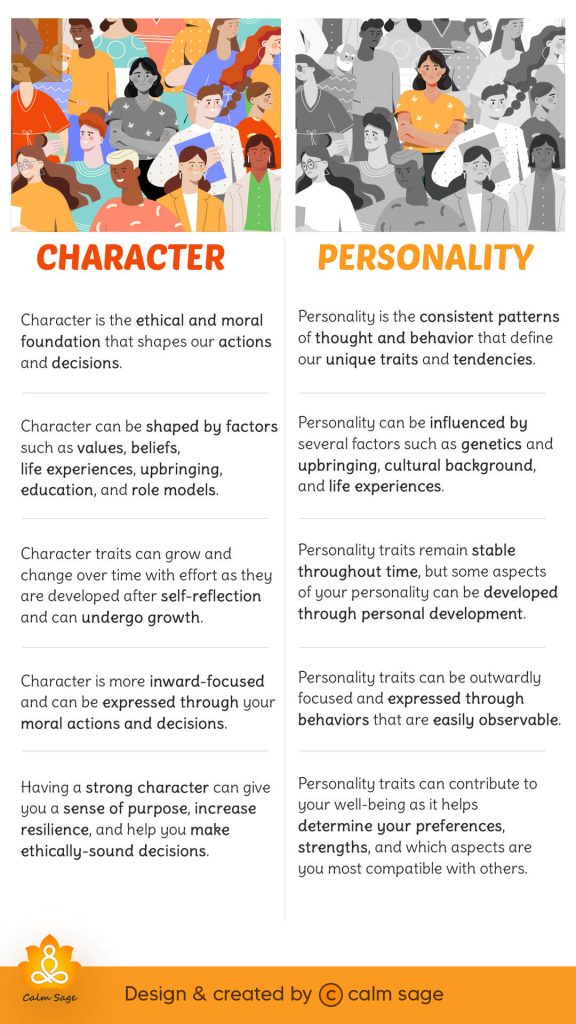Character vs Personality: Exploring The Differences And Importance of Each

In our journey of self-exploration and self-discovery, there are a lot of things we come across – from personality traits to characteristics we possess. These two terms, “personality” and “character” are concepts that many of us have been using interchangeably, but we often fail to understand the true meaning of these aspects of our well-being.
When I say, “personality”, I mean the inclinations, the natural traits that make you you whereas when I say, “character” I mean the attitudes, beliefs, and moral compass you possess.
While many people confuse personality and characteristics with each other, these two concepts hold very distinct meanings when it comes to contributing to our mental as well as emotional well-being. In this blog, we’re exploring the differences between personality and character and how important each of them can be for our well-being.
Defining Character and Personality
1. Personality
When we talk about personality in terms of psychology, it is a complex concept that encompasses the thinking and behavioral patterns that we see in our everyday lives. The kind of company we keep, how we act in social or professional situations, or how we act in our day-to-day lives all form our personalities.
Personality is our outer expression that shows through observable traits and actions, can be influenced by our genes, situation, and experiences, and can also indicate our expression of emotions, attitudes, and preferences.
Some common personality traits that we might have can include;
- Extraversion
- Neuroticism
- Openness
- Sociability
- Agreeableness
- Honesty
- Self-confidence, and more
2. Character
On the other hand, characteristics or character is the essence of us and represent our moral compass, values, beliefs, and integrity. Our character is more observable in situations where we apply our beliefs to situations we face or experience. Here’s an example; if you believe in equal rights, then your character may influence you to speak up or act.
More often than not, our character develops when we face situations that challenge our beliefs. The nature of those challenges may spur us into action and develop the traits that may change or influence our beliefs, values, and attitudes.
Some common character traits that we may develop in our lives are;
- Loyal
- Generous
- Kind
- Persistent
- Open-minded
- Brave
- Quiet, and more
Personality vs. Character: The Differences
Personality and character are two different aspects of our self-identity wherein each aspect carries its influence on the other. Knowing the difference between personality and character is essential for our growth, self-awareness, and mental well-being. Here are some common differences between character and personality;
1. The Definition
Personality is the set of consistent thought and behavioral patterns that can define our unique traits and tendencies. This is what we can observe through our preferences, social connections, emotional responses, and even communication style.
Character, on the other hand, represents the ethical and moral attitudes that shape our actions and decisions. This is what reflects our essence as an identity and includes our values, principles, and moral compass. Character, unlike personality, is turned inwards.
2. The Influences
Personality can be influenced by several factors such as genetics and situational factors. Genetics can contribute to traits like introversion and extroversion, emotional sensitivity, and even spontaneity. Situational or environmental factors that can contribute to personality development can include your upbringing, cultural background, and life experiences.
When we talk about character development, it can be shaped by factors such as your values, beliefs, and life experiences. Your character is developed after thorough self-reflection and moral reasoning as well as the choices you make in different situations. Character development is also influenced by your upbringing, education, and role models.
3. The Flexibility
Personality traits remain stable throughout time with consistency in different situations, but some aspects of your personality can be developed through personal development, even if the core traits remain the same throughout your life.
When it comes to character, these traits can grow and change over time with effort. Because character traits are developed after self-reflection, you can evaluate your values, beliefs, and moral behaviors after some time and see if these traits require growth or improvement.
4. The Expression
When it comes to personality traits, they can be outwardly focused and expressed through behaviors that are easily observable such as social interactions, communication styles, and more. Personality influences how you relate to others, approach experiences, and regulate your emotions. Personality traits can also be categorized such as extrovert and introvert, openness, agreeableness, etc.
Character, on the other hand, is more inward-focused and is expressed through your moral actions and decisions. Characteristics are what guide your behavior to align with your values and principles. Your character qualities can influence how you express your personality traits.
5. The Effects on Well-Being
Personality traits can contribute to your well-being as it helps determine your preferences, strengths, and which aspects are you most compatible with others. When you know your personality traits, can help with self-acceptance, and healthy relationships, and even help guide you toward the activities and career paths that align with your inner values.
When we talk about characteristics, they can also play a huge role in improving your mental and emotional well-being. When you have a strong character, then it can give you a sense of purpose, increase resilience, and help you make ethically-sound decisions.

The Importance of Personality And Character on Our Well-Being
Character is one aspect of your personality. Character traits you possess can influence major areas of your life such as work, social life, and relationships. Character traits are the essence of your being while personality traits are how you express yourself and the essence of your being to the world. While these two aspects are not interchangeable, they are interconnected.
In various studies, it has been found that personality traits can influence your mental and emotional well-being. In one particular research, it was found that people with the personality trait of conscientiousness were more likely to be physically healthy than people without the personality trait.
In another study, it was found that neuroticism as a personality trait puts you at more risk of cardiovascular diseases.
Personality traits, whether you like it or not, can influence your health and well-being, however, character traits may affect the decisions and actions you make in your everyday life.
Wrap-Up
Personality and character traits may intertwine in your everyday life, and knowing the difference between them can help you work on your mental and emotional well-being. While character traits represent the essence of our being and the guiding light that drives us to make moral and ethical decisions, personality traits are how we express our characteristics to the world.
When you foster character and personality traits, you take a step closer to leading a balanced life and finding harmony within. Both these elements are important for your life experiences and to help you nurture your well-being.
I hope this blog helped you understand the difference between personality and character. If you agree with the above-mentioned distinctions between personality vs. character, then let me know in the comments below.
You can also write to me at info@calmsage.com if you have anything else to add to the differences.




















